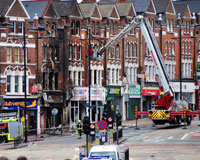Six months ago this week, London and several other cities endured three days of riots.
The August unrest caused more than £370m of damage as properties were destroyed and shops looted. But as well as the physical scars left by the riots came fears over the long-term damage to the affected areas if investors and developers were deterred from ploughing resources into these vulnerable neighbourhoods.
These fears led the Greater London Authority and other councils to raise funds to help regenerate the worst-hit areas.
But with the Association of British Insurers last month claiming that just £12m of the £200m riot insurance bill had been paid out, exactly what progress has been made?
A total of £177m has been made available by the GLA for the London boroughs that were affected by last summer’s riots and pockets of the cash are starting to be put to use.
Tottenham
In Tottenham, N17, Haringey council is spending the £41m it received to help it “build back better”. It wants to improve the transport infrastructure and public realm connected to the area’s main regeneration project, Premier League club Tottenham Hotspur’s makeover of its White Hart Lane stadium.
A further £4m has been set aside to buy sites to rebuild more than 160,000 sq ft of offices and shops throughout the borough.
The council also has the nous of respected development veteran Sir Stuart Lipton, one of the founders of Chelsfield Partners to tap into. Lipton has been working with Haringey to put together plans for the longer-term regeneration of the borough.
Alan Strickland, Haringey cabinet member for economic development and social inclusion, says: “Sir Stuart Lipton sits in the meetings of Tottenham Taskforce, a new GLA and council scheme that has two targets: to create a consultation draft on priorities and measures for regenerating Tottenham, and to put together a masterplan for the regeneration of north Tottenham, including the area around the stadium. My personal view is that we need to build back better.”
He added: “The key benefit that Lipton can offer is to link us to the private development sector, where he has contacts and can provide valuable advice.”
Croydon
South of the river, in Croydon, the council is also pushing ahead with its regeneration plans, despite the departure of its executive director of planning, Stephen McDonald, last week (4 February, p28). One high-profile victim of the riots was Croydon’s 144-year old furniture store, House of Reeves, which was burned to the ground. Proposals for the rebuilding of the site at Reeves Corner will be unveiled before the end of March.
Croydon also has counsel from a major private sector business expert. It has brought on board Pret a Manger founder Julian Metcalfe to advise on how to spend the £23m it received from mayor Boris Johnson’s office to improve access to the area and attract businesses.
Elsewhere in south London, £10m is being spent to rejuvenate Peckham Rye station and town centre, while in Hackney, east London, the council is using its £5.3m of City Hall cash to develop a fashion outlet hub. A team of architects and retail specialists are also about to be appointed in Hackney to draw up design guidelines and business plans to attract customers back to the town centre.
So, although little money may have yet been paid out – with reports this week claiming that almost 90% of riot victims are still waiting for compensation – the wheels are starting to turn. But for this to gather pace, national and local governments and the public and private sectors need to work together.
“Sweeping up the debris is a quick-fix solution, and the need for a coherent approach to regeneration in many affected areas remains as pressing as ever,” says British Property Federation chief executive Liz Peace. “Last summer’s riots do not seem to have dimmed the property industry’s ability or appetite for delivering development but it will take a national vision and local leadership to help turn this into shovels in the ground.”
joanna.bourke@estatesgazette.com











